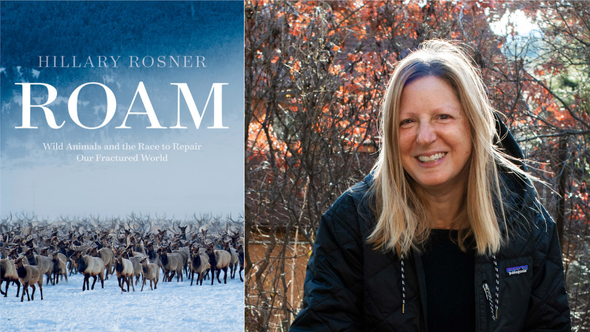A Hopeful Future for the Planet?

Doors open at 6 PM. The cafe will not be serving their regular menu this evening, but some snacks will be an available. Apologies for the inconvenience.
Join us in-person in the Daily Planet Cafe or watch the livestream on YouTube.
Our human-engineered world is filled with barriers to wildlife movement: roads, cities, fences, dams, border walls. But there are also innovative efforts to build wildlife corridors and otherwise reconnect Earth’s ecosystems so that wild animals can move and ecosystems can function. This panel discussion will explore the science and stories of connectivity—what it is, why it matters, and where the most interesting work is happening.
Hillary Rosner’s newest book, ROAM: Wild Animals and the Race to Repair Our Fractured World, will be available for sale and signing by the author.
Hillary Rosner is an award-winning science journalist whose new book, ROAM: Wild Animals and the Race to Repair Our Fractured World, explores the global fragmentation of ecosystems and the barriers preventing wildlife from moving freely—and chronicles some of the people working tirelessly around the world to knit the planet back together. Hillary’s work has been published in National Geographic, The New York Times, The Washington Post, The Atlantic, Scientific American, Wired, and dozens of other publications. She teaches journalism at the University of Colorado, where she is also assistant director of the Center for Environmental Journalism.
Dr. Roland Kays is Head of the Biodiversity Research Lab at the North Carolina Museum of Natural Sciences and is a Research Professor at NC State University. He is an expert in using new technologies to study free-ranging animals, especially to track their movement with telemetry, GPS, and remote camera traps. He combines this high-tech work with traditional methods, collecting data through new field work and studies of museum collections.
Dr. Madhusudan Katti is Director of Science, Technology, and Society and Associate Professor for Public Science in the Department of Integrative Humanities and Social Sciences and the Department of Forestry and Environmental Resources at North Carolina State University. He is the Editor-in-Chief of The Bulletin of the Ecological Society of America. His work centers Reconciliation Ecology—the application of evolutionary ecology to find real-world solutions for reconciling biodiversity conservation with human wellbeing. An ecologist by training, he engages local communities and the broader public in studying how human activities and histories of colonization and segregation shape the distribution of nature and biodiversity, especially in urban areas, in the context of global climate change. He is also interested in the ethics of ecological research, nature conservation, and of how humans learn to live with other species. He is actively engaged in rethinking and redesigning his own research and the teaching of ecology and conservation biology within a broader framework of decolonizing science.
Grab a bite from the Daily Planet Café and join host Chris Smith for our monthly Science Café. Gather with other curious minds at this after-hours event for an informal presentation and conversation about current science topics with guest experts.


